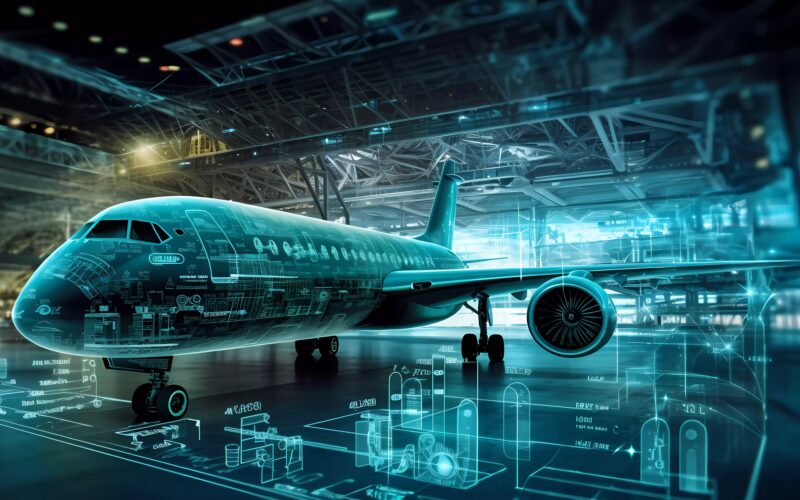In 2023, artificial intelligence permeates virtually every industry across the globe. Aviation is no exception with AI reaching new heights – literally.
From commercial airlines and the armed forces to private charters and aircraft maintenance, AI has been embraced by multiple businesses, with some saying that this is just the tip of the iceberg. In fact, in September, American Airlines’ senior manager of AI told the Connected Aviation Intelligence Summit that “AI is going to be everywhere”.
AI and aviation
But how is AI currently used in aviation? Not surprisingly, its use is multi-faceted, from AI programs that help with booking flights to big data employed by air traffic management companies to utilize real-time information from various sources such as radar, satellites, weather stations, and aircraft sensors. When it comes to AI, there’s a lot to consider. For instance, there’s predictive maintenance which aims to improve a fleet’s performance, as well as sophisticated AI tools that improve decision making and enhance the use of scarce resources. The list goes on and on.
As for information, Dmitry Pavluyk, head of the Data Analytics and Artificial Intelligence research cluster as well as professor and study programme director at TSI, Transport and Telecommunication Institute in Latvia, recently told AeroTime that an enormous volume of data which comes in real-time is essential for businesses. TSI offers a range of courses, including Bachelor’s and Master’s double degree programs in Computer Science with a specialization in Artificial Intelligence.
Pavluyk says that looking to the future, “the aviation industry will require professionals with advanced skills in research, data engineering, data analytics, and machine learning to effectively leverage big data solutions”. He adds: “Addressing this challenge is no simple task, especially considering the scarcity of skilled professionals in the global labor market.”
And consider the incredible progress made in autopilot technology. More than a century after the invention of the autopilot, aerospace engineers continue to innovate, working to expand the number of automated processes in the cockpit. Their goal? To improve safety and efficiency with the aid of AI.
And what about the benefits of AI in aircraft maintenance? In addition to predictive maintenance, AI algorithms can examine airspace restrictions and other factors to optimize flight paths and reduce fuel consumption. AI can also improve customer experience with the provision of personalized recommendations and by solving consumer issues. Security can also be enhanced when AI is used to scrutinize passenger data and identify possible threats. Data analytics go hand in hand with AI, and, considering the demands of entrepreneurial companies, specialists with the skills to implement in-time adaptive solutions are always wanted.
What does the future hold for aviation and AI?
At this year’s Paris Air Show, nearly every exhibitor was seeking to exploit the potential for AI, according to a recent report, including in the field of manufacturing, repair, and maintenance. Experts say that the US Department of Defense and its main contractors already use AI tools, but generative AI – a type of AI that can produce various types of content including synthetic data – has the potential to make a much larger impact on the entire aviation industry.
Sustainability
In terms of future impact, it’s impossible to talk about innovative AI in aviation without mentioning sustainability and the industry’s commitment to reduce emissions, improve efficiencies in terminals and aircraft design, and explore the next generation of clean-tech aviation.
Furthermore, in conjunction with improving the ability of the air network to scale capacity up or down depending on the growth or decline of traffic, AI also has the potential to reduce the environmental impact of air traffic.
A note of caution
It’s worth remembering that AI still has a long way to go, and questions remain about its various applications, not least how to explain the intricacies of its operation to regulators, aircrew and passengers.
When it comes to boosting or redirecting your career, anyone seeking to deepen their knowledge of the aviation industry, its businesses and processes, as well as furthering their career, is welcome to consider the qualifications offered by TSI, in Latvia.
TSI’s double degree in Aviation Management has been designed in collaboration with the University of the West of England (UWE) and, after a year-and-a-half or two years of study, provides a unique opportunity to obtain degrees from both universities. Studies are designed for working professionals. Co-created using UK education standards – acknowledged worldwide as the highest education quality – this Master’s programme enables students to broaden their professional networks, enjoy hands-on experience via internships at airports and with various aviation firms, and allows access to the valuable resources of both educational institutions.
The Double Degree in Aviation Management Master’s programme is beneficial for graduates from the perspective of in-demand skillsets and networking. For those interested in Data Analytics & Artificial Intelligence, within aviation and beyond, as well as in Management of Information Systems, Transport and Logistics, or other study opportunities (including distance learning), you are welcome to learn more about what’s on offer at TSI or book an online appointment with the admissions team by following this link: https://tsi.lv/
https://www.aerotime.aero/articles/artificial-intelligence-the-final-frontier-in-aviation
